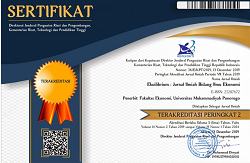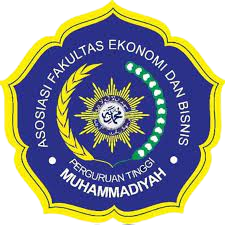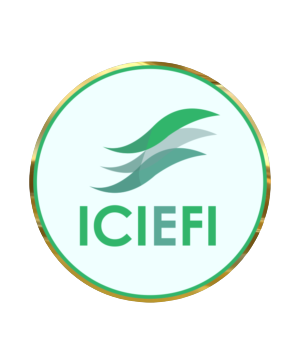Sociopreneurship and Philanthropy during Pandemic COVID-19: A Matchmaker Idea
DOI: 10.24269/ekuilibrium.v17i2.2022.pp139-148
Abstract
The current economic situation is dire because of the Covid-19 pandemic, which has increased unemployment, reduced income, and reduced people's well-being. Many social issues become homework that necessitates real-world solutions. The 1.12 million increases in the number of poor people in 2021 is a clear indication of the need for steps to address social needs that are not being met by the private sector or the government. This study aims to conduct a literature review on the concept of sociopreneurship in general, as well as to investigate the role of sociopreneurship and Philanthropy in mitigating the effects of the Pandemic's economic downturn. Sociopreneurship, which places priority on social advantages without compromise on material gains and philanthropy, has more positive impacts than if the two were to take place separately. The findings show that sociopreneurship is a type of entrepreneurial initiative that can be developed with the primary goal of assisting the community, and that philanthropy plays an important role in supplementing government programs by providing community contributions and solidarity aimed at reviving economic activity.
Keywords
Sociopreneurship; Enterprise; Philanthropy
References
- Abu-Saifan, S. (2012). Social Entrepreneurship: Definition and Boundaries. Technology Innovation Management Review, 6.
- Bornstein, D., & Davis, S. (2010). Social Entrepreneurship what Everyone Needs to Know. Oxford University Press.
- Central Bureau of Statistics, C. B. of S. (2021). Jumlah Penduduk Miskin (Ribu Jiwa) menurut Kabupaten/Kota [Laporan Tahunan]. Cebtral Bureau of Statistics. https://www.bps.go.id/indicator/23/619/1/jumlah-penduduk-miskin-ribu-jiwa-menurut-kabupaten-kota-.html
- Cesaroni, F. M., & Consoli, D. (2015). Are Small Businesses Really Able to Take Advantage of Social Media? 13(4), 12.
- Chen, X. (2021). Immigrant-owned Small Businesses’ Participation in Diaspora Philanthropy: A Case Study during the COVID-19 Outbreak. New England Journal of Entrepreneurship, 24(2), 105–121. https://doi.org/10.1108/NEJE-08-2020-0033
- Dacin, P. A., Dacin, M. T., & Matear, M. (2010). Social Entrepreneurship: Why We Don’t Need a New Theory and How We Move Forward from Here. Academy of Management Perspectives, 22.
- Dewi, N. I., & Melati, F. C. (2021). The Impact on Economic and Environmental Development of COVID-19 Pandemic: A Case Study in Indonesia. Ekuilibrium : Jurnal Ilmiah Bidang Ilmu Ekonomi, 16(1), 1. https://doi.org/10.24269/ekuilibrium.v16i1.3364
- Ding, L., & Jiang, C. (2021). Restaurant Proactive Philanthropic Activities and Customer Loyalty: A Scenario-Based Study during the COVID-19 Pandemic Period. International Hospitality Review, 35(2), 260–279. https://doi.org/10.1108/IHR-08-2020-0045
- Gibson, H. (2008). Ideology, Instrumentality and Economics Education: On the Secretion of Values within Philanthropy, Financial Capability and Enterprise Education in English Schools. International Review of Economics Education, 7(2), 57–78. https://doi.org/10.1016/S1477-3880(15)30089-X
- Humas BAZNAS. (2020). Zakat di Masa Pandemi Covid-19 (Update Covid-19). Badan Amil Zakat Nasional. https://baznas.go.id/Press_Release/baca/BAZNAS_Lakukan_Inovasi_Pengumpulan_Zakat_di_Masa_Pandemi_Covid-19/583
- Huruta, A. D., Sasongko, G., & Sari, P. I. A. (2019). The Determinant of Female Worker’s Income in Central Java. Jurnal Ilmu Ekonomi Dan Pembangunan, 19(1), 12.
- Iman, N., Santoso, A., & Kurniawan, E. (2021). Wakif’s Behavior in Money Waqf: An Approach to Theory of Planned Behavior. Ekuilibrium : Jurnal Ilmiah Bidang Ilmu Ekonomi, 16(1), 12. https://doi.org/10.24269/ekuilibrium.v16i1.3184
- Ivanoff, C. S., Yaneva, K., Luan, D., Andonov, B., Kumar, R. R., Agnihotry, A., Ivanoff, A. E., Emmanouil, D., Volpato, L. E. R., Koneski, F., Muratovska, I., Al-Shehri, H. A., Al-Taweel, S. M., & Daly, M. (2017). A global probe into dental student perceptions about philanthropy, global dentistry and international student exchanges. International Dental Journal, 67(2), 107–116. https://doi.org/10.1111/idj.12260
- Khan, T. (2019). Venture waqf in a circular economy. ISRA International Journal of Islamic Finance, 11(2), 187–205. https://doi.org/10.1108/IJIF-12-2018-0138
- Liu, A. (2020). Philanthropy and humanity in the face of a pandemic–A letter to the editor on “World Health Organization declares global emergency: A review of the 2019 novel coronavirus (COVID-19)” (Int J surg 2020; 76:71–6). International Journal of Surgery, 79, 10–11. https://doi.org/10.1016/j.ijsu.2020.05.012
- Lutfi, A., & Verawaty. (2020). Peran Kewirausahaan Sosial terhadap Pengembangan Usaha Sektor UMKM Saat Kondisi Pandemi Covid 19 di Kota Makassar. PARADOKS: JURNAL ILMU EKONOMI, 3(2), 6.
- M. Huber, M., & Mafi, S. L. (2013). Education par excellence: Developing personal competencies and character through philanthropy-based education. Journal of Accounting Education, 31(3), 310–332. https://doi.org/10.1016/j.jaccedu.2013.07.001
- Nafie, A. V. B., Subagiarta, I. W., & Prianto, F. W. (2020). Determinan Angka Pengangguran di Jawa Timur Tahun 2007-2017. Jurnal Ilmu Ekonomi dan Pembangunan, 20(1), 10.
- Nicholls, A. (2008). Social entrepreneurship: New models of sustainable social change. OUP Oxford.
- Nour Aldeen, K., Ratih, I. S., & Sari Pertiwi, R. (2021). Cash waqf from the millennials’ perspective: A case of Indonesia. ISRA International Journal of Islamic Finance. https://doi.org/10.1108/IJIF-10-2020-0223
- Palesangi, M. (2012). Pemuda Indonesia dan Kewirausahaan Sosial. Prosiding Seminas Competitive Advantage, 1(2), 6.
- Ramadani, V., Hisrich, R. D., & Rashiti, S. G. (2015). Female entrepreneurs in transition economies: Insights from Albania, Macedonia and Kosovo. World Review of Entrepreneurship, Management and Sustainable Development, 11(4), 391. https://doi.org/10.1504/WREMSD.2015.072066
- Rusdiana, A., Setia, R., Muin, A., & Abdillah, A. (2020). Management of Student Entrepreneurship Development at the West Java-Indonesia Private Islamic College. International Journal of Higher Education, 9(6), 286. https://doi.org/10.5430/ijhe.v9n6p286
- Thompson, J., & Doherty, B. (2006). The diverse world of social enterprise: A collection of social enterprise stories. International Journal of Social Economics, 33(5/6), 361–375. https://doi.org/10.1108/03068290610660643
- Uitermark, J., Nicholls, W., & Loopmans, M. (2012). Cities and Social Movements: Theorizing beyond the Right to the City. Environment and Planning A: Economy and Space, 44(11), 2546–2554. https://doi.org/10.1068/a44301
- UNDP (Ed.). (2020). The next frontier: Human development and the Anthropocene. United Nations Development Programme.
- Weerawardena, J., & Mort, G. S. (2012). Competitive Strategy in Socially Entrepreneurial Nonprofit Organizations: Innovation and Differentiation. Journal of Public Policy & Marketing, 31(1), 91–101. https://doi.org/10.1509/jppm.11.034
- Wibowo, H., & Nulhaqim, S. A. N. (2015). Kewirausahaan sosial: Merevolusi pola pikir dan menginisiasi mitra pembangunan kontemporer. Unpad Press.
- World Bank. (2020). Global Economic Prospects, June 2020. World Bank. http://hdl.handle.net/10986/33748
- World Bank, W. B. (2021). Global Economic Prospects, June 2021. World Bank.
- Zimmerer, T. W., N. M, S., & Wilson, D. (2008). Zimmerer, T. W., Scarborough, N. M., & 2008). Entrepreneurship and small business management. Salemba Empat.
Refbacks
- There are currently no refbacks.

This work is licensed under a Creative Commons Attribution-ShareAlike 4.0 International License.













